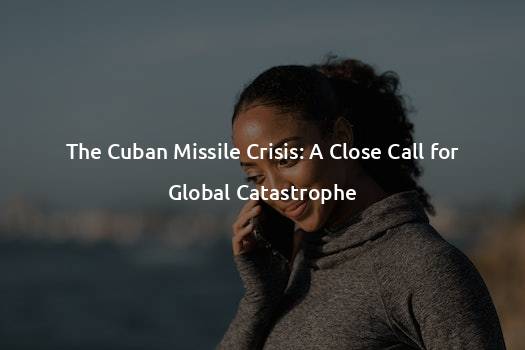The Cuban Missile Crisis: A Close Call for Global Catastrophe
The Cuban Missile Crisis: A Close Call for Global Catastrophe
In October 1962, the world teetered on the edge of an unprecedented nuclear conflict. The Cuban Missile Crisis, a seminal moment in the Cold War, brought the United States and the Soviet Union dangerously close to engaging in a devastating nuclear war. This article explores the events leading up to the crisis, the tense negotiations that took place, and the ultimate resolution that averted catastrophe.
The Prelude to Crisis
The Cuban Missile Crisis was rooted in the broader context of the Cold War, a period of intense rivalry between the United States and the Soviet Union. In the early 1960s, the U.S. government became increasingly concerned about the spread of communism, particularly in Latin America.
In 1959, Fidel Castro led a successful revolution in Cuba, establishing a communist regime just 90 miles from the shores of the United States. The Soviet Union saw an opportunity to gain a strategic foothold in the Western Hemisphere and provided military and economic aid to Cuba.
Throughout 1961 and 1962, the U.S. government monitored the construction of Soviet missile sites in Cuba. American intelligence agencies eventually discovered that the Soviets were installing medium-range ballistic missiles capable of carrying nuclear warheads. The presence of these missiles posed an unprecedented threat to U.S. national security.
Escalation and Tensions
Upon learning of the missile installations, President John F. Kennedy addressed the nation on October 22, 1962. He announced an immediate naval blockade of Cuba, warning that any attack from the island would be met with a full-scale retaliation against the Soviet Union.
This declaration sent tensions soaring, putting the world on high alert. Over the next several days, military forces on both sides prepared for a potential conflict. The world held its breath as the superpowers seemed poised to engage each other in a nuclear showdown.
The Negotiations
Despite the heightened tensions, President Kennedy and Soviet Premier Nikita Khrushchev recognized the gravity of the situation and initiated a series of secret negotiations to defuse the crisis. Through backchannel communications, the leaders sought a peaceful resolution that would preserve global stability.
Kennedy proposed a deal to Khrushchev: the United States would remove its missiles from Turkey, near the Soviet border, in exchange for the withdrawal of Soviet missiles from Cuba. Although this quid pro quo was never publicly acknowledged, it formed the basis of the negotiations.
As the world anxiously watched, the diplomats worked diligently behind the scenes. Exchanges of letters between Kennedy and Khrushchev conveyed their intentions to find a peaceful solution. These letters revealed personal appeals, with Kennedy emphasizing the catastrophic consequences of a nuclear war and Khrushchev expressing a desire for dialogue rather than confrontation.
The Resolution
After nearly two weeks of intense negotiations, tensions finally began to subside. On October 28, 1962, Khrushchev announced through a public message that the Soviet Union would dismantle its missile sites in Cuba. A crisis that could have sparked a global nuclear holocaust was averted, and the world breathed a collective sigh of relief.
Secretly, as part of the agreement, the United States also committed to remove its missiles from Turkey. This aspect of the resolution was not publicized at the time but was an essential component in persuading the Soviets to withdraw their missiles from Cuba.
TLDR;
The Cuban Missile Crisis brought the world to the brink of a devastating nuclear war in October 1962. The presence of Soviet missiles in Cuba led to heightened tensions between the United States and the Soviet Union. Through intense negotiations and secret communication, President Kennedy and Premier Khrushchev averted catastrophe and resolved the crisis. The crisis highlighted the inherent dangers of nuclear proliferation and served as a reminder of the importance of diplomacy and dialogue in resolving conflicts.







